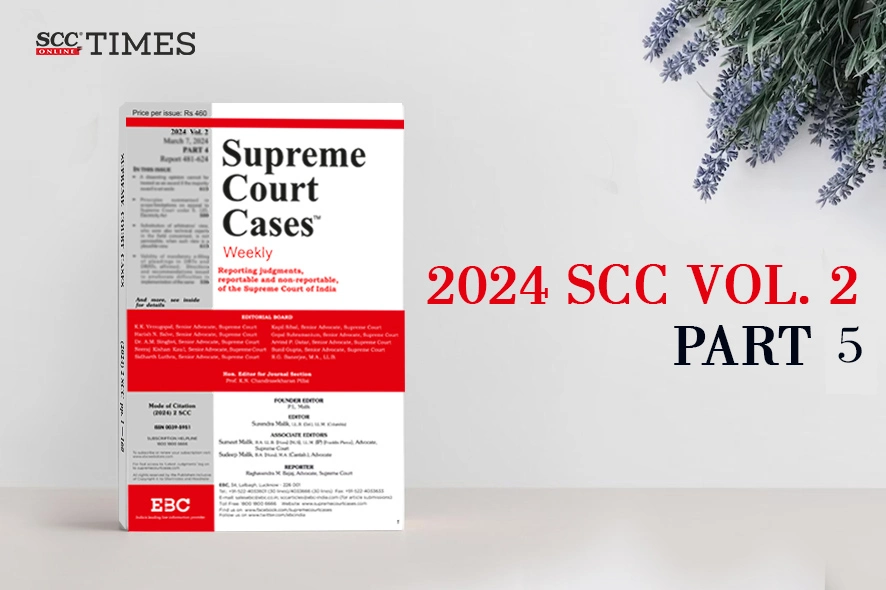Constitution of India — Sch. X and Art. 145(3) — Power of Speaker/Deputy Speaker to initiate disqualification proceedings, when proceedings for removal from the office initiated against them: Important constitutional questions relating to interpretation of Sch. X regarding disqualification, as well as powers of Speaker and Governor and power of judicial review thereof are involved in this case, hence matter requires reference to a five-Judge Bench under Art. 145(3). [Subhash Desai v. State of Maharashtra, (2024) 2 SCC 825]
Constitution of India — Sch. X and Arts. 179(c) and 191(2) — Disqualification of Member under Sch. X: In this case, the issue was permissibility of adjudication of disqualification of Member under Sch. X, by Speaker, when notice of intention to move a resolution for removal of Speaker himself has been issued. Ruling in Nabam Rebia, (2016) 8 SCC 1 on this issue held, warranted re-consideration by larger Bench, hence, matter so referred to larger Bench. [Subhash Desai v. State of Maharashtra, (2024) 2 SCC 719]
Constitution of India — Sch. X and Arts. 179(c) and 191(2): In this case, the issue was permissibility of adjudication on disqualification of a member by Speaker, when notice of intention to move a resolution for removal of Speaker himself has been issued and ruling in Nabam Rebia, (2016) 8 SCC 1, on this issue, whether to be referred to larger Bench, determined. [Subhash Desai v. State of Maharashtra, (2024) 2 SCC 822]
Criminal Procedure Code, 1973 — S. 374 — Appeal against conviction — Interference by appellate court in — When warranted: Appellate court should be slow in interfering with conviction recorded by courts below. But where evidence on record indicates that prosecution has failed to prove guilt of accused beyond reasonable doubt and that a plausible view, different from one expressed by courts below can be taken, appellate court should not shy away in giving benefit of doubt to accused persons. [Jitendra Kumar Mishra v. State of M.P., (2024) 2 SCC 666
Security Interest (Enforcement) Rules, 2002 — R. 9(5) — Power of forfeiture of deposit conferred on secured creditor under: Law extensively explained on power of forfeiture of deposit conferred on secured creditor under R. 9(5). Cardinal necessity of vigilance against and weeding out of attempts by defaulting borrowers to rig the auction-sale to their benefit, emphasized. [SBI v. C. Natarajan, (2024) 2 SCC 637]
Service Law — Recruitment Process — Reservation — Submission of certificate in support of claim for reservation after cut-off date: Rakesh Kumar Sharma, (2013) 11 SCC 58 holding that eligibility criteria/conditions must be considered on last date of receipt of application and Ram Kumar Gijroya, (2016) 4 SCC 754 holding that claims for inclusion in OBC category can be considered even in cases where certificates were not produced by applicants before cut-off date notified in advertisement. In view of general importance of question, matter referred to larger Bench of three Judges. [Karn Singh Yadav v. State (NCT of Delhi), (2024) 2 SCC 716]
Service Law — Recruitment Process — Reservation — Submission of reserved category certificate/document beyond cut-off date — Effect of: Due to split judgment by Division Bench of Supreme Court for considering candidature of OBC/EWS candidates who had failed to submit category certificates within stipulated time and relevance of possibility of change in status of OBC/EWS candidates due to change in social and/or economic status, matter referred to larger Bench. [Sakshi Arha v. High Court of Rajasthan, (2024) 2 SCC 671]
Specific Relief Act, 1963 — S. 34 — Dismissal of suit for declaration based on oral partition — Validity: In this case, High Court ignored oral and documentary evidence and reversed concurrent findings of courts below dismissing suit, recorded perverse finding that oral partition had taken place by relying on two sale deeds and one mortgage deed, which related to different pieces and parcels of land. Suit of plaintiff, held, was rightly dismissed by courts below. [Rajendhiran v. Muthaiammal, (2024) 2 SCC 661]
Unlawful Activities (Prevention) Act, 1967 — S. 43-D(2)(b) — Grounds for grant of extension of time for investigation up to maximum prescribed period of 180 days: In this case, reasons given under cl. (b) made out and explained in extension order. Further, if accused are found to have link with any terrorist, matter should not be taken lightly. [State (NCT of Delhi) v. Raj Kumar, (2024) 2 SCC 632]







